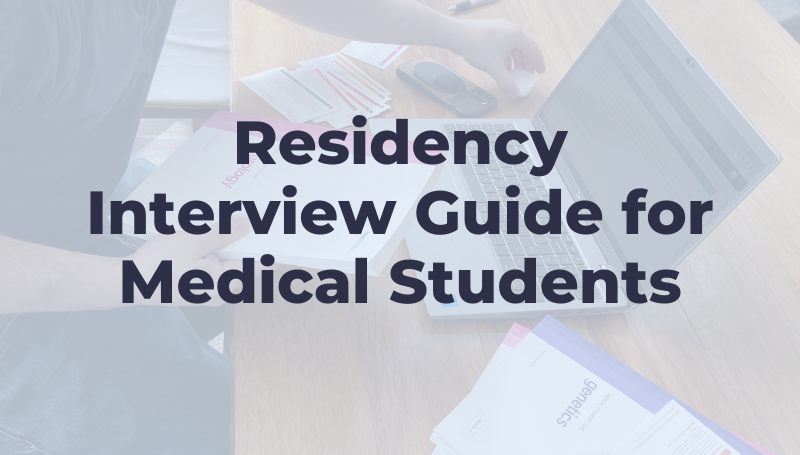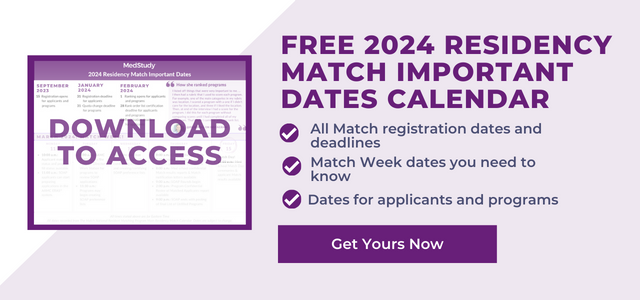
If you’re a medical student, just thinking about your upcoming residency interviews probably sends a shiver down your spine. The key to these interviews going well is preparing ahead of time and going into them with confidence. The good news is that all residents and physicians were in your shoes at one point, and some have shared great insights. We've scoured social media and gathered some of our favorite tips from doctors, that will help you stay confident throughout your residency interview journey.
1. Understand the ins and outs the residency interview process
You’ll want to do some research so you can go into your interviews and Match process as informed as possible. Look into the interview process and schedule for each residency program you are interviewing with. Learning more about each residency program will also help you decide where you think you will actually be a good fit.
You’ll likely also find things that would be great to bring up in the interview on their website or social channels. What is the culture like? What is their mission? How many residents are in the program? All these things can help you get a better picture of what your day-to-day life in this program would look like, and what you want to cover in your interview. Find where you fit in and try to highlight that in your discussion. Maybe they've gone on a group bike ride recently, and you can bring up your love of cycling. Find something about the program that you can connect with personally to bring up during the interview, and you'll make a great impression.
2. Prepare for your virtual residency interview
You may be able to do a virtual interview from your couch, but that is not a license to slack off! Make sure to take the time to make sure that you make a good first impression, virtually.
Find a good place to sit during your interview ahead of time with good lighting and a tidy background, so everyone can get a good look at your face without any distractions. Download any apps you'll need for the meeting and make sure to check that your camera and microphone are working properly. Don't forget to log in to the meeting on time (or early) the day of your interview.
Some interview tips from the coordinator perspective:
— Courtney Matlach (@CourtneyMatlach) December 7, 2020
It's fine to log in 10 minutes before it's scheduled to start (people would show up early in person!)
Ensure you enter your first + last name when you sign on (it makes it easier for us to quickly identify you)#Match2021
A great residency interview tip from a program coordinator on Twitter.
3. Have answers for questions you know you'll be asked
Although you won’t know exactly what you will be asked during the interview, you can assume that you’re likely to get some behavioral questions, some questions about you, about your specialty, and maybe a few odd personality questions to keep you on your toes. Planning ahead will help boost your confidence before the interview starts.
4. Get ready to talk about yourself
Your interview will probably start with something along the lines of, “Tell me about yourself." Plan out how you are going to answer this question. This is a great opportunity to start your interview out on a good note, so take advantage of it!
Prepare a short “elevator pitch” about yourself that covers who you are, your qualifications and accomplishments, and why you are a great fit for this residency program. Take the time to write this down and work on it until you’re happy with it. This should be short and sweet and set the tone for the rest of the interview.
5. Have answers for behavioral questions prepared
The interviewer will likely be asking you questions about how you would react to hypothetical situations or how you tend to deal with people in order to gauge how you would fit into their program. To prepare for these questions, write down 10-15 recent examples from your life or school about your behavior that you can talk about during the interview. Did you deal with a stressed-out patient recently? Maybe you experienced a conflict with co-workers that you learned from.
Telling these stories about yourself is a great way to stick in the minds of everyone you’re interviewing with and give them a better understanding of who you are. A story about how you used creative solutions to help a patient recover is much more effective than just saying you are an out-of-the-box thinker.
#MedStudentTwitter Interview Tip!
— Angel Gómez-Cintrón, MD, MPH (@skeletalrad) September 28, 2020
Be personable 🤗 and not robotic 🤖 - aim for a human connection.
There's a difference between:
☝️I like to hike on my free time
&
✌️My passion for hiking has taken me to amazing places and taught me the value of a healthy lifestyle
Tell short stories in your residency interview to get your personality across better.
Dr. Pam Hong shared an excellent strategy for answering behavioral questions on Instagram called the STARR approach. Use this to answer any behavioral questions.
Situation: Provide the backdrop/context for the story
Task: What goal were you or your team attempting to accomplish?
Action: What did you do to contribute to accomplishing the goal?
Result: Outline the results & how it influenced others
Reflect: What did you do well & how did you improve upon any shortcomings?
Check out the full post below:
Dr. Pam Hong shared a great series of residency interview tips on her Instagram.
This approach gives you an effective framework to answer these questions with stories that get across all of the important points that you want to cover, and impress the program director!
6. Relax and be yourself
During your residency interview, don’t forget to relax and be yourself! When in doubt, remember why you decided to be a doctor in the first place. You are making a big step in your journey to becoming a practicing physician, and once you're through your residency interviews, you'll be glad you took the time to prepare.
Pre interview jitters are real but once you start talking about what you love to do, it all flows naturally.
— Syeda Asfia Hussain (@SyedaAsfiaHuss1) November 6, 2020
#PedsMatch21 #InterviewTips
Focus on why you love being a physician to avoid residency interview jitters.
You got this!




